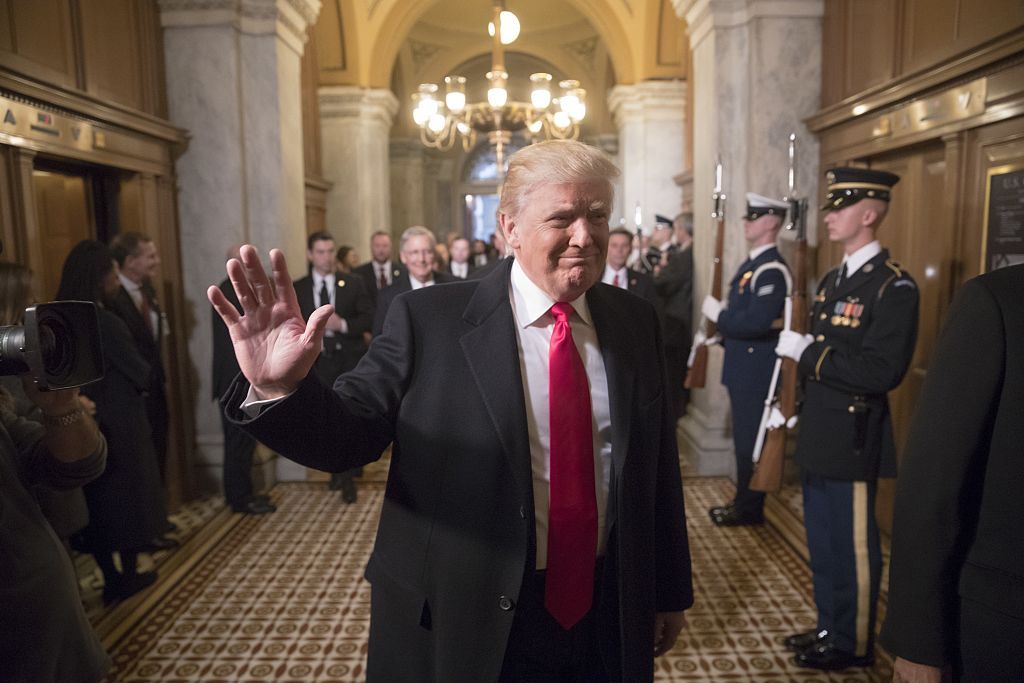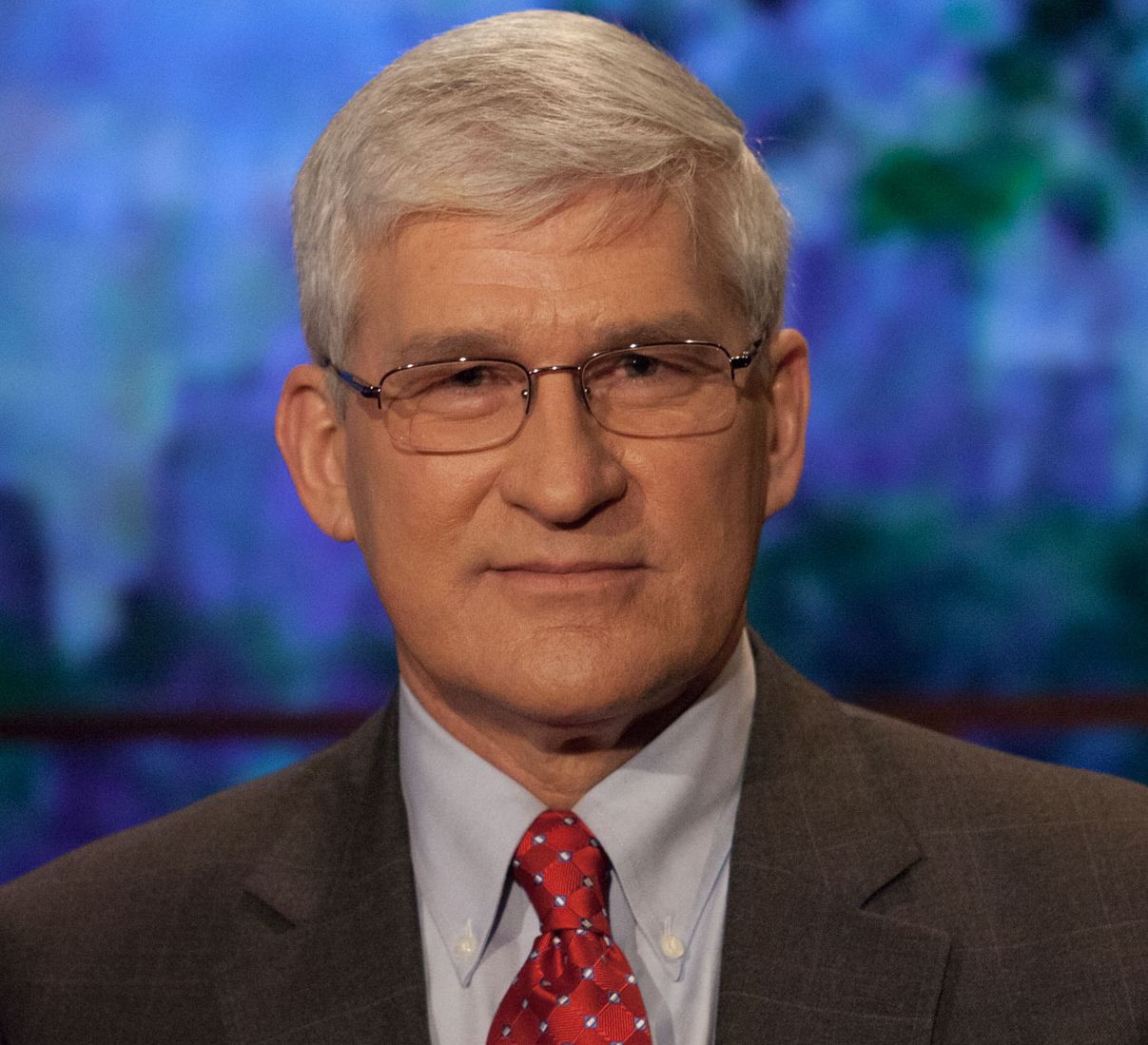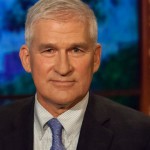
President-elect Donald Trump arrives for his inauguration ceremony at the Capitol in Washington, DC on Jan. 20, 2017. (Photo by J. Scott Applewhite / Pool / AP/Anadolu Agency/Getty Images)
Everybody is talking about the first 100 days of Donald Trump’s presidency. You can take a quiz from The New York Times, scroll through 100 days worth of tweets and video at The Washington Post or peruse lists of executive orders and other markers. We asked some former guests to tell us whether or not it’s been all they expected.
Impulsive, Erratic, Unprincipled

Andrew J. Bacevich
Rest assured, fellow citizens: US foreign policy during the Trump era won’t be guided by a commitment to “America First,” whatever Donald Trump himself may have meant when he revived that loaded phrase.
Yet here’s the bad news: With “America First” now in the discard pile, we are left with a president who gives little evidence of subscribing to any identifiable worldview or set of fixed diplomatic principles.
During his first 100 days in office, Trump abrogated, modified beyond recognition or managed to forget altogether a veritable host of promises previously advertised as necessary to “Make America Great Again” and to break the stranglehold of the despised foreign policy establishment. That sharp departure from past practice hasn’t happened.
So whether for good or for ill, any number of familiar US policies will persist — at least for now. Trump isn’t going to jettison NATO, once declared “obsolete,” but now deemed admirable and essential. He won’t be making Vladimir Putin his BFF. He will neither nullify the decades-old “One China” policy nor pick a trade war with the PRC over its alleged currency manipulation. He won’t renounce the Iran nuclear deal and he won’t be shifting the US embassy in Israel to Jerusalem anytime soon. Rather than abandoning NAFTA, Trump now says he wants to renegotiate it. And while “a big, fat, beautiful wall” may yet appear along the US border with Mexico, the administration has pretty much conceded that Mexico won’t be footing the bill.
None of this backtracking suggests that Trump has all along adhered to a coherent grand strategy that he is only now choosing to unveil. What’s happening is that Trump is being initiated into the realities of world politics and the limits of his own authority. Put simply, he is bumping up against complexity and constraints.
That said, as president, Trump retains the prerogative to act. When he does, for example, in ordering a cruise missile attack targeting a Syrian airfield, he responds to impulse or to the urgings of whoever has most recently bent his ear, whether some member of his team or a foreign leader passing through Mar-a-Lago. The term that best describes present-day US policy is whimsical. Make that whimsical with a penchant for bombing something.
So you and I don’t know what Trump will do next. Nor do America’s friends and adversaries. Nor do institutions comprising the national security apparatus such as the military and the intelligence community. Nor, in all likelihood, does Trump himself.
The ship of state is rudderless. Dead ahead lie a plethora of rocks and shoals.
— Andrew J. Bacevich, author most recently of America’s War for the Greater Middle East: A Military History.
First 100 Days Reflection

Simone Campbell
The first 100 days of the Trump administration has been like drinking from a fire hose. It has been worry under pressure. Even before the inauguration, we lobbied Congress to stop the Republicans in their attempt to repeal Affordable Care Act without a replacement. In the first week Congress was back in session we generated more than 10,000 phone calls — this is remarkable for our little organization, but is a sign of how engaged our people are. When we stopped the “Repeal and Delay” tactic, I began to have hope.
By March 24, when House Speaker Ryan withdrew the poorly conceived “American Health Care Act” from the House floor, it was light in an otherwise challenging time. But what I learned is that we the people can be heard and can stop bad proposals when we stay focused and engaged in broad coalitions. That day, I felt like we can still make a difference in federal policy. It was the combination of in-DC lobbying, constituent phone calls, media and messaging that made this win possible.
But then health care was “off the table” and the administration was “moving on.” This was true for a couple of weeks and then it was back on the table again. In this policy merry-go-round, the president seems to say whatever pops into his head without a strategic plan. So as I write this, I’m not sure what will happen. I wondered how this can continue in this ad hoc fashion unencumbered by facts, truth or history.
Then I realized that for our president, everything is transactional. The only thing that matters is “winning” in this moment, and if you are losing, cut your losses and move on. This is the business model that he follows. But this is NOT politics. In politics we keep encountering the same people over and over. It is short-sighted to make enemies over any one transaction. Our president needs to learn this secret to political life that Sen. Kennedy taught us: no permanent enemies, no permanent friends.
Donald Trump does not realize that we the people who care about the common good work in community to make it happen. For me, this underscores the way forward: Only in community can our democracy succeed. Let us stay together for the long haul. We can emerge stronger for it…if we are faithful.
— Sister Simone Campbell of NETWORK Lobby for Catholic Social Justice and leader of Nuns on the Bus
Communities of Color as “Others”

Angela Glover-Blackwell
While candidate Trump outrageously targeted Muslims, immigrants and people with disabilities, he shrewdly kept black communities out of his crosshairs. Yes, he smeared black people and ranted ludicrously about inner cities. And of course he’d been birther-in-chief. Maybe he calculated that was enough racist bait for his base, and if he didn’t overtly go after the black population, his opponents wouldn’t be able to make the racist label stick.
But his racism and xenophobia are all-encompassing. One hundred days have shown that he views communities of color, including black communities, as “others” who have no place in his America. How else to explain why his administration wants to gut public education, civil rights laws and protections, affordable housing, police reforms and other systems, laws and institutions that support communities of color, low-income especially, to participate and succeed? Attorney General Jeff Sessions is trying to cut off federal grants to sanctuary cities, revive the devastating policies of mass incarceration and undo federal agreements aimed at turning around police departments that have criminalized black communities. Ben Carson supports a proposal to cut more than $6 billion from the HUD budget, including eliminating the community development grants that are crucial for connecting distressed neighborhoods to opportunity. Under Betsy DeVos the Education Department has revoked Obama-era protections for people in default on student loans, leaving them on the hook for exorbitant fees. Now the administration wants to slash $9 billion from the department’s budget while investing in private school vouchers, a clear signal that great public education is not on the agenda.
Perhaps the biggest story of these 100 days, and certainly the most uplifting, is the development of a determined mass movement of resistance. This movement must remain vigilant, courageous and responsive to attacks on many fronts. It must be a voice for inclusion, justice, the future of the planet and policies that support all people to participate and prosper in this nation. Remember: a threat to the most vulnerable among us is a threat to all.
— Angela Glover-Blackwell, founder of PolicyLink.org
Trump’s Impact on the Democrats

Simon Johnson
In November, the Democrats were defeated and demoralized. The next four years looked bleak — the Republicans had an apparently strong grip on both the presidency and Congress.
The mood now is completely changed. The Democrats are back in business — and a different kind of Democratic Party seems poised to emerge. Strong new candidates for elective office are throwing their hats into the ring and there are intense discussions about fresh policy ideas. There’s an air of near inevitability about the idea of Trump’s Republicans losing big in 2018, at the national and state level. What caused this dramatic shift in such a short period of time?
The answer is simple. Donald Trump resisted the idea that he should govern as any kind of moderate, and decided to adopt and impose the most extreme ideas possible right from the beginning of his presidency. He appointed extreme right-wing figures — from all the extreme factions of the Republican Party (and there are many). He signed extreme executive orders, including on immigration. And his legislative agenda on health care, finance and taxes could be summed up in one word: extreme.
Everyone who could be antagonized was antagonized. And then voters found that congressional Republicans had no good answers when pressed on Trump’s actions, ethics and policies.
Jason Chaffetz, chair of a powerful House committee, was told in no uncertain by his constituents: “Do your job” — meaning conduct proper oversight of the presidency. Chaffetz has chosen instead to resign.
Across the country Republicans are refusing to hold town hall meetings or they making it very difficult to for voters to attend. Many representatives have stopped answering the phone or responding personally to constituents. This results naturally in a lot more frustration among voters and a further increase in protest activity.
But all that really matters in politics is votes. The recent special election results in Kansas and Georgia have demonstrated that a previously strong presumed Republican majority can evaporate during the Trump era. Next up: Montana. This is not a House election that has attracted a great deal of attention from the national level Democrats, yet — as Trump’s promises, policies and connections to Russia come under closer scrutiny — everything is potentially in contention.
The Democrats now realize they likely will take back the House in 2018. The House of Representatives is designed to swing and popular sentiment — of the kind that actually motivates voting — is running hard against Trump’s Republicans. After exactly 100 days, the Trump regime starts to unravel.
— Simon Johnson, economist and editor of BaselineScenario.org
The Killer Asteroid Missed Us By That Much

Mike Lofgren
Like many, I anticipated Donald Trump’s presidency with the dread that a predicted impact of a continent-sized asteroid would induce. But thus far his malice has been mercifully tempered by epic incompetence.
From the comically sloppy drafting of his immigration ban (stayed by the courts), to the mega-disaster of repeal-and-replace (“Who knew that health care could be so complicated?”), to the border wall debacle, Trump’s achievements, like his favorability ratings, are historically meager.
Just as gratifying, his palace courtiers are often too busy stabbing each other in the back to find time to plot against the public. The multitude of Goldman Sachs co-conspirators in his administration is a depressing spectacle, but hardly worse than with Bush II or Obama. Meanwhile, their presence causes Trump’s white nationalist base to seethe with the wounded indignation of a jilted lover.
Trump has left the vast majority of Senate-confirmable positions in the agencies unfilled. While it is unfortunate that those agencies are rudderless, it would be worse if they were already staffed with dedicated wreckers like Betsy DeVos.
This week, as the 100-day milestone loomed, so did a government shutdown. In an incredibly clumsy maneuver, Trump tried to hold Obamacare funding hostage in exchange for border wall funding. In only two days, he climbed down from his demand; it turns out he was trying to threaten his hostages with a squirt gun.
We cannot count on such luck to hold in the future. While the first 100 days have been less dire than feared, there are still 1,361 remaining for Trump to work his mischief. His shocked discovery that North Korea does not respond well to reality-TV bluster could end in real disaster, rather than the comic-opera kind. The nepotism, conflicts of interest and payola of his administration make Ferdinand and Imelda Marcos look like Trappist monks.
But there is a lesson to be gained. While Trump is undoubtedly an authoritarian, he is one who is also ignorant, lazy and possessed of a short attention span. He got where he is by bluff, bluster and empty threats, but when facing unaccustomed and resolute resistance, he folds because he’s never had to work hard before, or do complicated planning. Those flaws in his character leave an opening for a counter-strategy.
And for cautious hope.
— Mike Lofgren, author and former GOP Congressional analyst







